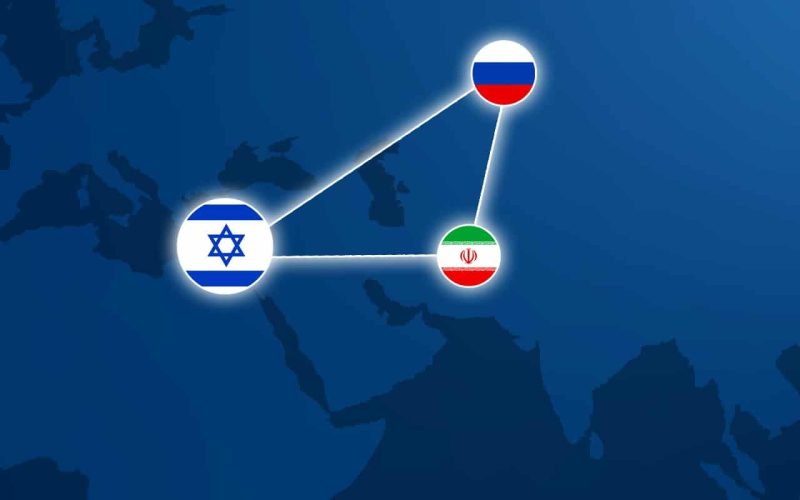As tensions intensify between Israel, Iran, and the Hezbollah militant group in Lebanon, military experts have pointed out that Russia may be seeking to capitalize on the situation. The Institute for the Study of War (ISW) recently stated that Kremlin is attempting to exploit the conflict in the Middle East to further expand its influence and security architecture, as the region faces a new wave of unrest.
At the heart of Russia’s foreign policy, especially under President Vladimir Putin, lies the concept of a “multipolar world”—an alternative to the US-led global order. The unfolding crisis in the Middle East, where a potential direct confrontation between Israel and Iran looms, presents Moscow with a significant opportunity to assert itself as a pivotal player. As the conflict extends its reach into Lebanon, Russia is positioning itself to play a larger diplomatic role, as seen in its recent engagements with various Middle Eastern actors.
Diplomatic Overtures and Condemnations
In the past few weeks, Russia has ramped up its diplomatic efforts to address the escalating conflict. Mikhail Bogdanov, Russia’s deputy foreign minister, expressed strong condemnation of Israel’s military operations in southern Lebanon during a meeting with Lebanon’s ambassador to Russia. He also voiced opposition to Israel’s alleged political assassinations, marking Moscow’s stance as critical of Israeli actions. On another front, Anatoly Viktorov, Russia’s ambassador to Israel, called for an immediate cessation of hostilities, urging a diplomatic resolution to the conflict.
The involvement of Russian Foreign Minister Sergey Lavrov further explains Moscow’s ambitions. Lavrov has met with Arab diplomats, calling for an end to the military operations between Israel and Palestinian forces. According to the ISW, these diplomatic efforts aim to draw Middle Eastern nations into Russia’s security sphere, seeking to expand its strategic influence in the region.
Competing with the West
Russia’s interest in the Middle East is not new. Analysts argue that Moscow has long viewed the region as a battleground where it can contest Western influence. The Washington Institute for Near East Policy pointed out that Putin sees this competition as part of a larger existential struggle with the United States, using defense and military ties to secure a foothold in the region. In this sense, the ongoing conflict serves Russia’s broader goal of distracting international attention from its invasion of Ukraine and weakening the coalition of nations supporting Kyiv.
While Russia’s immediate involvement in the Middle East conflict is primarily rhetorical, analysts caution that Moscow’s capacity for tangible intervention may be limited due to its resource constraints. Nevertheless, the diplomatic capital Russia is investing in the region could pay off in the long run, allowing it to establish itself as a critical mediator and power broker in the Middle East.

Russia’s Reliance on Iran
One of the key dynamics driving Russia’s current policy in the Middle East is its deepening military cooperation with Iran. Since Russia’s invasion of Ukraine, Tehran has provided significant military assistance, making Moscow increasingly dependent on Iranian weaponry. This growing reliance has intertwined Russia’s interests with those of Iran and its allies, such as Hezbollah.
According to Middle East specialist Ruslan Suleymanov, Iranian military instructors are now regularly visiting Russia, even assisting in the construction of a drone production facility. This deep military collaboration has, in effect, pulled Russia into Iran’s orbit, requiring Moscow to back Tehran’s regional allies, including Hezbollah, in return for vital military resources.
Implications for Global Power Dynamics
As Russia deepens its ties with Iran and seeks to expand its influence in the Middle East, its role as a global power is set to evolve further. By positioning itself as a mediator in the ongoing conflicts, Moscow aims to carve out a larger share of the region’s geopolitical dynamics, challenging Western influence. At the same time, the Kremlin’s actions highlight its strategic goal of maintaining focus on Ukraine by leveraging regional conflicts to divert global attention.
For the West, the latest flare-up in the Middle East presents yet another challenge. The conflict complicates efforts to maintain a unified stance against Russia, particularly in support of Ukraine. As Middle Eastern nations face growing unrest, the Western coalition may find it increasingly difficult to expand or sustain support for Ukraine, giving Moscow a potential advantage in its broader geopolitical contest with the United States and its allies.
Russia’s Balancing Act But Aiming For Benefit
Despite its willingness to exploit instability, Russia is not seeking another full-scale war in the Middle East. Both Ruslan Suleymanov and Malinin, experts on the region, agree that Moscow’s goal is to manage chaos, not ignite a larger conflict.
“Moscow is not interested in a huge firestorm,” said Suleymanov. He referenced an incident in April when tensions between Israel and Iran seemed on the brink of escalating into a major war. After Israeli airstrikes hit an Iranian consulate in Damascus, killing senior Iranian commanders, Iran retaliated by firing missiles into Israel for the first time. Despite these developments, Russia did not fully back Iran. Instead, Moscow called for restraint on both sides indicating its desire to avoid a widespread conflict.
While Russia refrains from encouraging outright war, it does benefit from the ongoing turmoil in the Middle East. As Suleymanov noted, “Russia benefits from the chaos.” The focus of the United States and its allies has shifted toward the Middle East, diverting attention away from the war in Ukraine, giving Russia some breathing room in its geopolitical standoff with the West.
However, Suleymanov also emphasized that the Kremlin is not keen on seeing the situation escalate into a full-scale conflict. “The Kremlin would not like to see another major war,” he stressed.
Russia and Iran, despite their shared hostility toward the United States and their joint support for Syrian President Bashar al-Assad, still maintain a cautious approach. Both countries were deeply involved in the Syrian civil war, with Russia providing air support to Assad’s forces and Hezbollah fighting on the ground. Russia’s strategic interests in Syria include not only military bases but also access to oil and gas resources.
To prevent tensions from spiraling out of control, Moscow has used its influence with Tehran to keep Hezbollah from escalating conflict along the Israeli-Syrian border. This shows Russia’s ability to balance its alliances while managing conflicts in a way that serves its strategic interests.
According to Levina, a Russian researcher based in Beirut, there is a tacit understanding between Russia and Israel when it comes to Syria. Despite being allies with opposing sides in the Syrian conflict, Russia has maintained a neutral stance during Israeli strikes on Hezbollah positions in southern Syria. Levina pointed out that Russia’s response has often been to do nothing, even when its troops are stationed nearby, allowing Israel to strike Hezbollah without interference. She also noted Israel’s reluctance to provide military assistance to Ukraine, suggesting this may be part of the broader arrangement between the two nations.
In this delicate balance, Russia appears content with maintaining a degree of chaos in the region that keeps its adversaries occupied, while ensuring that the chaos does not spiral into a war it cannot control. This strategic ambiguity allows Russia to play both sides, advancing its influence without directly engaging in another costly conflict.

Russia’s Complex History with Lebanon and Hezbollah
Russia’s relationship with Lebanon, particularly Hezbollah, has been shaped by historical complexities and pragmatic diplomacy. During the Soviet era, Lebanon held a limited but significant place in Moscow’s strategic interests. Lebanese students, particularly members of the Communist Party, were regularly invited to study in the Soviet Union, including at the Patrice Lumumba University in Moscow. This connection fostered a degree of sympathy for modern Russia, which is still occasionally visible today, with billboards of President Vladimir Putin appearing in Shia and Orthodox Christian areas in Lebanon.
According to Levina, the Soviet Union was highly engaged with Lebanon’s communist parties, sharing common interests such as support for Palestine and the Armenian diaspora in Lebanon. However, in the present day, Russia’s relationship with Lebanon is not as extensive, and its ties to Hezbollah remain complicated.
A Tense History
One of the more infamous incidents in Russia-Hezbollah relations occurred during the Lebanese Civil War (1975-1990). Hezbollah allegedly took three Soviet diplomats hostage in an effort to pressure Moscow to use its influence over Syria to halt shelling in Tripoli. After one of the hostages was executed, the KGB is rumored to have responded in brutal fashion, kidnapping and mutilating a Hezbollah leader’s relative, which led to the swift release of the remaining Soviet hostages. Though neither Hezbollah nor the Kremlin has officially verified this account, it remains a stark reminder of the strained relationship between the two.
Despite these past tensions, Hezbollah and Russia, while sharing a de facto alliance in Syria, have never been particularly close. Reported friction has persisted, especially regarding Hezbollah’s ongoing presence in Syria. These differences highlight the delicate nature of their cooperation.
Russia’s Limited Involvement in Lebanon
Russia’s current interests in Lebanon are relatively restrained. While its involvement in Syria is more direct, its footprint in Lebanon remains minimal. However, as instability in the region rises, Moscow is taking steps to safeguard its interests. On Thursday, Russia evacuated 60 family members of its diplomatic staff from Lebanon amidst growing tensions, though over 3,000 Russian nationals remain in the country. The evacuation effort also involved delivering 33 tonnes of humanitarian aid, including food, medical supplies, and power generators. Further evacuations may follow if the situation escalates.
Mark N. Katz, a professor emeritus at George Mason University, who writes extensively on Russian foreign policy in the Middle East, asserts that Russia is unlikely to offer security guarantees to Middle Eastern countries. With the ongoing war in Ukraine consuming much of its resources, Katz argues that Russia’s primary goal is to “stay on good terms” with all regional players, executing what he describes as a “delicate balancing act.” While Moscow aims to maintain relevance in the Middle East, it seeks to avoid getting entangled in new, protracted conflicts.
Using Middle Eastern Conflicts to Advance Interests
Russia has often been accused of leveraging Middle Eastern conflicts to further its security and economic interests. Just last week, Reuters reported that Russian officials had met with the Houthis in Tehran at least twice this year to negotiate the sale of anti-ship missiles, which the Houthis could potentially use to target ships in the Red Sea.
Russia’s broader Middle Eastern strategy is also evolving. According to the Jamestown Foundation, a defense policy think tank, Russia is working to form a coalition with Iran, Iraq, and Syria. By acting as a mediator in the Israeli-Palestinian conflict, Moscow aims to strengthen its influence over Middle Eastern and Eastern Mediterranean gas sales, especially liquefied natural gas.
Additionally, Russia has used its defense relationships with some Middle Eastern nations to support its own military efforts in Ukraine. For instance, it has procured Iranian short-range ballistic missiles and Shahed drones to bolster its forces.
Snapshot
Russia’s approach to Lebanon and Hezbollah is emblematic of its broader Middle Eastern strategy—engage where necessary, but avoid deep entanglement. While its historical ties to Lebanon remain present, Russia’s modern-day involvement is cautious and pragmatic. In its pursuit of influence in the Middle East, Moscow walks a fine line between maintaining relevance and avoiding another costly conflict amidst its ongoing war in Ukraine.
Similalry, Russia’s efforts to exploit the Middle East conflict reflect its ambitions to assert greater influence in the region, expand its security architecture, and counterbalance the West. Whether these maneuvers will yield tangible benefits for Moscow remains to be seen, but in the short term, they signal Russia’s intent to play a central role in the region’s future.









